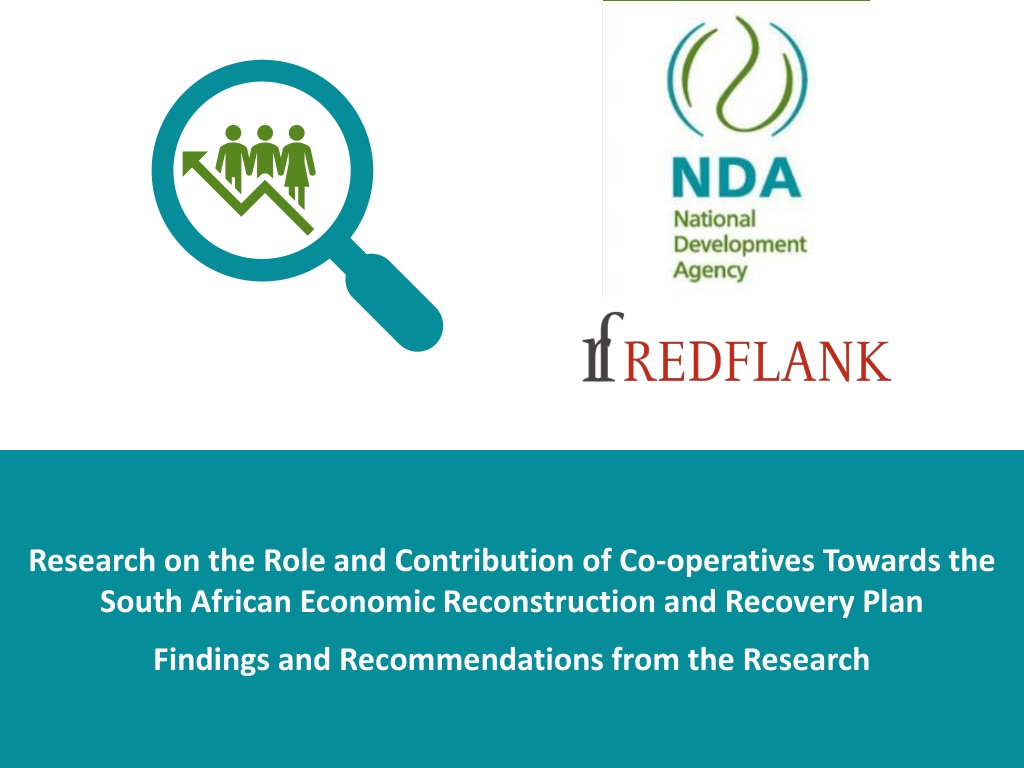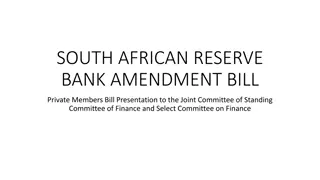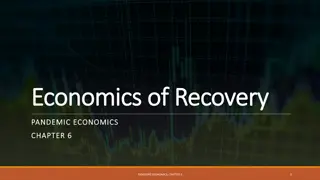Role of Co-operatives in South African Economic Recovery
Research findings highlight the challenges faced by co-operatives during the COVID-19 period in South Africa, impacting their contributions to the economy. Key obstacles include lack of shared vision, client losses, and limited market access. Government support is crucial for co-operatives to thrive and aid in economic reconstruction.
Download Presentation

Please find below an Image/Link to download the presentation.
The content on the website is provided AS IS for your information and personal use only. It may not be sold, licensed, or shared on other websites without obtaining consent from the author.If you encounter any issues during the download, it is possible that the publisher has removed the file from their server.
You are allowed to download the files provided on this website for personal or commercial use, subject to the condition that they are used lawfully. All files are the property of their respective owners.
The content on the website is provided AS IS for your information and personal use only. It may not be sold, licensed, or shared on other websites without obtaining consent from the author.
E N D
Presentation Transcript
Research on the Role and Contribution of Co-operatives Towards the South African Economic Reconstruction and Recovery Plan Findings and Recommendations from the Research
Agenda Project Objectives Research Findings Recommendations 2
Project Objectives To understand the role and contribution of co-operatives towards South Africa s economic reform and recovery during the COVID-19 period To explore the main impediments faced by co-operatives in competing in the South African economy at legislative, policy and strategic approach levels during COVID-19 and during lockdown regulations To examine to what extent these impediments have affected the operations/livelihoods of co-operatives and their existence during the COVID-19 period To identify mechanisms which may assist with strengthening the role of co-operatives as one of the main drivers of the economic recovery and reconstruction plan in South Africa To document and share the lessons learned by co-operatives, private sector and government in responding to the COVID-19 pandemic To understand the role of government and private sectors in supporting co-operatives towards restoring the economy To provide recommendations from the research findings that can build a sustainable, resilient and inclusive economy 4
Role and Contribution of Co-operatives during COVID-19 period Extent to which Co-operatives were able to Contribute Towards the Economy During COVID-19 100% 90% They can contribute much more if they can get grants from government. 80% (Academia Interview, 2021) 70% 60% 50% Most businesses we used to supply closed down during lockdown and didn t open again, so we don t have clientele anymore. 40% 29% 27% 30% 24% (Co-operative Interview, 2021) 20% 15% 10% 5% 0% Not at all Minimally Significantly Substantially Extensively Key Findings Challenges which impacted co-operatives contributions towards the economy included lack of a shared internal vision, loss of clients due to restrictions on movement and the inability to reach customers It was noted that in order for co-operatives to contribute towards economic recovery and reform, government support will be key Access to markets appears to be a challenge for some co-operatives. Some co-operatives were unable to sell their produce, while others were unable to meet the demands that come with access to new markets because they lack the necessary resources to produce on a larger scale. 6
Impact of COVID-19 on Co-operatives Extent to which Co-operatives were Impacted by COVID-19 National Lockdown Restrictions Extent to which the COVID-19 National Lockdown Regulations Negatively Affected Co-operatives' Ability to Contribute Towards the Economy 100% 100% 90% 90% 80% 80% 70% 70% 60% 60% 50% 50% 45% 50% 40% 40% 30% 30% 24% 17% 20% 20% 15% 13% 13% 10% 8% 10% 10% 5% 0% 0% Not at all Minimally Significantly Substantially Extensively Not at all Minimally Significantly Substantially Extensively Key Findings Co-operatives appeared to have faced several challenges as a result of restrictions imposed by the COVID-19 National Lockdown. Some of these challenges included difficulties in supplying products to their customers, as well as a loss of customers during the National Lockdown, which subsequently led to a decrease in profits. 7
Impact of COVID-19 on Co-operative Operational Status and Revenue 8
Impact of COVID-19 on Operations Extent to which the COVID-19 Pandemic Affected Operations 100% 90% Our operations were disturbed because our place of work had to be closed because of COVID-19. We saw that we had to pause operations because of regulations. 80% 70% 60% (Co-operative Interview, 2021) 47% 50% 40% 34% 33% 33% During the COVID-19 [pandemic], we received grants and were able to keep operating. 30% 18% 20% 14% 13% (Co-operative Interview, 2021) 8% 10% 0% 0% 0% Not at all Minimally Significantly Substantially Extensively Cooperatives NDA Empl. Positive Practice Some co-operatives received financial assistance in the form of grants during the COVID-19 pandemic and were therefore, able keep operating. Key Findings The majority of co-operatives appeared to have been impacted by the COVID-19 pandemic, having encountered issues such as loss of key members, halting operations due to lack of demand for their products, inability to travel to their customers due to restrictions on movement and a decrease in clientele, due to customers being afraid to travel to the co-operatives to buy products. Co-operatives appear to have been facing challenges which impacted their operations prior to the COVID-19 pandemic. 9
Impact of COVID-19 on Quality of Services Extent to which Co-operatives Quality of Services was Affected by Covid-19 100% 90% 80% 70% 60% 50% 40% 35% 30% 22% 20% 16% 14% 13% 10% 0% Not at all Minimally Significantly Substantially Extensively During COVID, not everyone in the farm was a skilled worker so it was tough. I had to go [and] get a certificate to upskill myself. We had to travel to go to the farm during the COVID-19 [pandemic], so it was a big problem for us since there were restrictions. And sometimes instead of ten employees coming to work, only two made it. (Co-operative Interview, 2021) Key Findings Restrictions on movement that were in place during the COVID-19 National Lockdown made it difficult for co-operative members to travel to work which resulted in shortages of skilled personnel. 10
Impact of COVID-19 on Ability to Manage Business Extent to which Covid-19 Negatively Affected Co-operatives Ability to Manage their Business 100% 90% Because of stress and sickness, some people were not in the right mind to manage their businesses. 80% 70% (NPO Interview, 2021) 60% 50% Required licenses could not be accessed because operatives had information on where to get them. most access co- to 40% no 34% 30% 25% (NPO Interview, 2021) 20% 15% 14% 12% 10% 0% Not at all Minimally Significantly Substantially Extensively Key Findings Stakeholders highlighted that the lack of movement due to the COVID-19 lockdown travel restrictions made it difficult for co- operatives to run their businesses. It was found that as a result of stress and poor health of individuals, some owners were unable to efficiently manage their businesses. 11
Challenges faced during COVID-19 pandemic Challenges Faced by Co-operatives During the COVID-19 Period Will Challenges Faced Continue Post the COVID-19 Period? 100% 80% 64% 60% 60% 59% 60% 35% 40% 32% 25% 65% 20% 0% Loss of income Lack of access to markets Cash Flow Decrease of Interrupted flow of goods Human resource constraints activities as a result of restrictions on movement Yes No We are suffering because there are no people on the street. A lot of people stay at home because of lockdown restrictions, so there is no one to sell our goods to. We only make money by selling baked goods and if there are no customers we suffer. (Co-operative Interview, 2021) Key Findings Some co-operatives stated that restrictions on movement impacted their ability to sell their products. Challenges experienced by co-operatives included lack of resources, access to markets and loss of employees due to the inability to generate income. Co-operatives in certain sectors, such as the sewing sector, may face the challenge of being unable to afford material for production post the COVID-19 period, given that their suppliers shut down during the COVID-19 period. 12
Adapting to Challenges Caused by COVID-19 Extent to which Co-operatives were able to Adapt to Challenges Faced During the COVID-19 Pandemic 100% 89% 90% 80% 70% 60% 50% 40% 29% 30% 25% 18% 20% 15% 13% 11% 10% 0% 0% 0% 0% Not at all Minimally Significantly Substantially Extensively Co-operatives NDA Positive Practices Some co-operatives were able to adapt to the challenges caused by the COVID-19 National Lockdown by producing and selling PPE items to their communities Some co-operatives adopted certain measures, such as the pooling of financial resources and the use of digital platforms in their operations in order to be able to adapt to the challenges posed by the COVID-19 pandemic Key Findings Other co-operatives were unable to adapt to the challenges brought by the COVID-19 National Lockdown, and were, therefore, forced to close their business due to a lack of finances and a lack of knowledge regarding how to apply for financial assistance. 13
Co-operatives Contribution Towards Unemployment Extent to which Stakeholders Agreed that Co-operatives Could Play a Meaningful Role in Reducing Unemployment Post COVID-19 Pandemic 100% 87% 90% [Co-operatives] are able to create jobs and pay stipends to their workers. We need to create an environment where they will be able to upscale their activities and give them access to markets. They can play a big role [in reducing unemployment] if they are adequately supported by government. 80% 70% 60% 50% 40% (NDA Interview, 2021) 30% 20% 8% 5% 10% 0% Strongly Disagree - Disagree Neither Agree or Disagree Agree - Strongly Agree Positive Practices The majority of stakeholders agreed that co-operatives could play a meaningful role in alleviating unemployment post COVID-19. Noting that co-operatives are the pillar of small and micro enterprises, which have a strong ability to create jobs. Co-operatives have a comparative advantage over other enterprises when it comes to job creation due to their labor-intensive nature which requires vast human resources. Key Findings There is a need for improvement regarding the management of co-operatives and the establishment of management structures. It was suggested that mentorship and entrepreneurial training be offered to co-operatives with financial management and administration skills. Some respondents indicated that co-operatives contributed towards reducing unemployment before the COVID-19 pandemic and still continue to do so, however, challenges such as the loss of employees and income negatively affected the ability of co-operatives to create jobs. 14
Support Received During the COVID-19 Period Was Support Received by Government, Private Sector and NDA During COVID-19 Period? Reason for Lack of Support Received (Co-operatives) 100% 90% 80% 70% 60% 23% 50% 40% 40% 32% 30% 20% 15% 77% 7% 5% 10% 2% 0% Applied for support but did not receive support I was not aware Other (please specify) Cooperative not eligible Too Cooperative does not need support cumbersome to apply for support Yes No Key Findings Several co-operatives did not receive any form of support from the government, private sector and the NDA during COVID-19, due to a lack of access to information; a lack of awareness regarding the types of support available and a lack of awareness regarding how to apply for the available support. Other barriers cited included the third-party costs associated with applying for support and compliance requirements not being met. 15
Impact of Support Received Extent to which Support Received Allowed Co-operatives to Provide Quality Services and Continue Operations 100% 90% 80% 70% 56% 60% 50% 40% 35% 30% 28% 27% 30% 23% 23% 20% 13% 13% 13% 11% 11% 8% 10% 4% 4% 0% Not at all Minimally Significantly Substantially Extensively Government Private Institutions NDA Positive Practice Several co-operatives were able to continue operating during the COVID-19 lockdown as a result of the support received from the government, private institutions and the NDA. The NDA should continue providing resources and other forms of support to co-operatives post COVID-19 to facilitate their contribution to economic recovery and reform. Key Finding Despite some co-operatives receiving support, it was not as effective due to the challenges that they continued to face as a result of the lockdown restrictions. It was found that some co-operatives lost customers and were unable to sell products, subsequently, these co- operatives could not keep operating. Certain stakeholders were also of the view that the lack of monitoring once support was allocated to co-operatives, resulted in a lack of accountability and the misuse of funds. 16
Role of Government, Private Sector and NDA Extent to which Respondents Agree that Government Support would Enable Co- operatives to Contribute towards the Economy Post the COVID-19 Period Type of Government Support Required 100% 90% 100% 80% 90% 65% 70% 79% 80% 60% 70% 50% 60% 40% 50% 30% 40% 18% 17% 20% 13% 10% 30% 6% 10% 15% 20% 0% Increased access to funding opportunities Conducting training with cooperatives Creating awareness of cooperatives Designing education and training materials Other (please specify) Reduced timeframe to acquire licences and permits 6% 10% 0% Strongly Disagree - Disagree Neither Agree nor Disagree Agree - Strongly Agree Key Findings Some co-operatives stated that both financial and non-financial assistance would be required from government in order to address the challenges encountered. It was found that government support may not be beneficial to some co-operatives, with some stakeholders highlighting that there appears to be a lack of collaboration, trust and a shared vision amongst co-operative members. There appears to be a need for training aimed at upskilling co-operatives to allow them to contribute to the economy. Ineffective implementation of the current legislation and policies appears to have prevented local government from providing support to co- operatives. 17
Positive Practices Focus Area Positive Practice Some co-operatives received financial assistance during the pandemic and were able to keep operating. Institutions should continue making efforts to provide financial assistance to co-operatives Impact of COVID-19 on Operations of Co-operatives Co-operatives Ability to Adapt to the Challenges Faced During the COVID-19 National Lockdown Some co-operatives were able to adapt to the challenges caused by producing and selling PPE items. Co-operatives adopted pooling of financial resources and the use of digital platforms & virtual approaches in their operations in order to adapt Respondents who received support from the NDA and the government were satisfied with the support received. The NDA should continue providing resources and other forms of support to co-operatives post COVID-19 Satisfaction with Support Received Several co-operatives were able to continue operating during the lockdown as a result of the support received from government, private institutions and the NDA. Impact of Support Received Stakeholders agreed that co-operatives could play a meaningful role in alleviating unemployment post COVID-19 as they are considered to be the pillar of small and micro enterprises which have a strong ability to create jobs. This may also be due to their labour- intensive nature which requires vast human resources. Role of Co-operatives in Reducing Unemployment Post COVID-19 Pandemic 19
Key Findings and Recommendations Key Theme Recommendations Lack of organisational structure, shared vision and access to information Place emphasis on addressing issues which existed prior to the pandemic; provide increased conflict resolution training or career guidance counselling to co-operatives; provide information r.e. proper governance Identify sectors most affected by the pandemic and facilitate the provision of support; link co-operatives to suppliers who are geographically closer; negotiate on behalf of co- operative for reduced rates; facilitate the development of partnerships between co- operatives to increase purchasing/bargaining power. Anticipated inability to afford material for production post the COVID-19 period. Lack of sustainability in the support provided to co- operatives Develop a database for co-operatives who have received support to enable the tracking of support provided; ask for feedback on support provided; conduct a tracer study to understand the impact of the support provided Ineffective implementation of legislation and policies preventing local government from providing support Increase engagements with local government officials; ensure policies have clear and achievable milestones and are cognisant of the different types of co-operatives; develop a policy that focuses on the empowerment of women within co-operatives. Lack of Funding Opportunities & Support From Government, Private Sector & the NDA Inform co-operatives of the various forms of support available to their businesses (incl. application processes and compliance requirements); provide capacity building and mentoring to co-operatives Lack of Monitoring after Support is allocated Ensure thorough monitoring processes are in place to measure impact of the support Challenges impacting co- operative's ability to create jobs Ensure co-operatives are aware of forms of funding available; develop a co-operative specific support plan to provide training to address issues 21
Key Findings and Recommendations Key Theme Recommendations Equip co-operatives with remote working skills and adequate digital tools; provide avenues for co-operatives to address skills shortages internally (e.g., registering with SETAs); conduct a study to determine potential opportunities available in a geographical location; provide relief support; provide special permits to co-operatives Access to Markets/ Restrictions on Movement Place emphasis on business and financial management training, mentorships and capacity building initiatives; provide ICT skills training workshops Lack of Skills Lack of Access to Internet and/or Technology Facilitate access to information for co-operatives in rural areas; partner with internet service providers; provide support such as subsidies to co-ops who cannot operate remotely Link co-operatives with opportunities for growth; host seminars to discuss the critical success factors of business and entrepreneurship; improve collaboration between co- operatives across provinces; ensure that co-operatives are not affected by political circumstances Barriers to Co-operative Expansion and Development 22
Thank you! 23



































